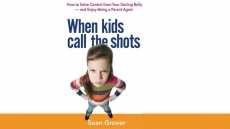EDMONTON — No need to buy that Porsche if you're pushing 40.
New research from the University of Alberta suggests there's no such thing as a mid-life crisis. It's more like mid-life bliss.
The "Up, Not Down" study was published in the academic journal Developmental Psychology.
It debunks the long-held belief that happiness declines between a person's teens and early 40s — or mid-life.
Lead researcher and psychology professor Nancy Galambos says she found the opposite — that people in her study were happier in their early 40s than when they were in their late teens and early 20s.
"I think it's because life is more difficult for younger people than for people in middle age," Galambos explains.
She says some young adults are depressed, have trouble finding work and sorting out their lives.
"There's a lot of uncertainty. But by middle age, a lot of people have worked that out and are quite satisfied through the earliest child-bearing years."
Galambos says most studies looked at a groups of people of various ages. She says the U of A study surveyed the same people — 1,500 of them — over many years, and is more reliable.
A group of Edmonton high schools students were tracked for 25 years and another group of graduating university students were followed for 14.

They were all asked the same question at different ages: "How happy are you with your life?"
On average, between ages 32 and 43, people experienced a slight dip in cheer.
"But at both times of measurement, they were higher in happiness than they were in their late teens and early 20s," says Galambos. "They didn't lose their earlier gains and happiness."
The study found happiness was higher in years when participants were married, in better health and had jobs.





